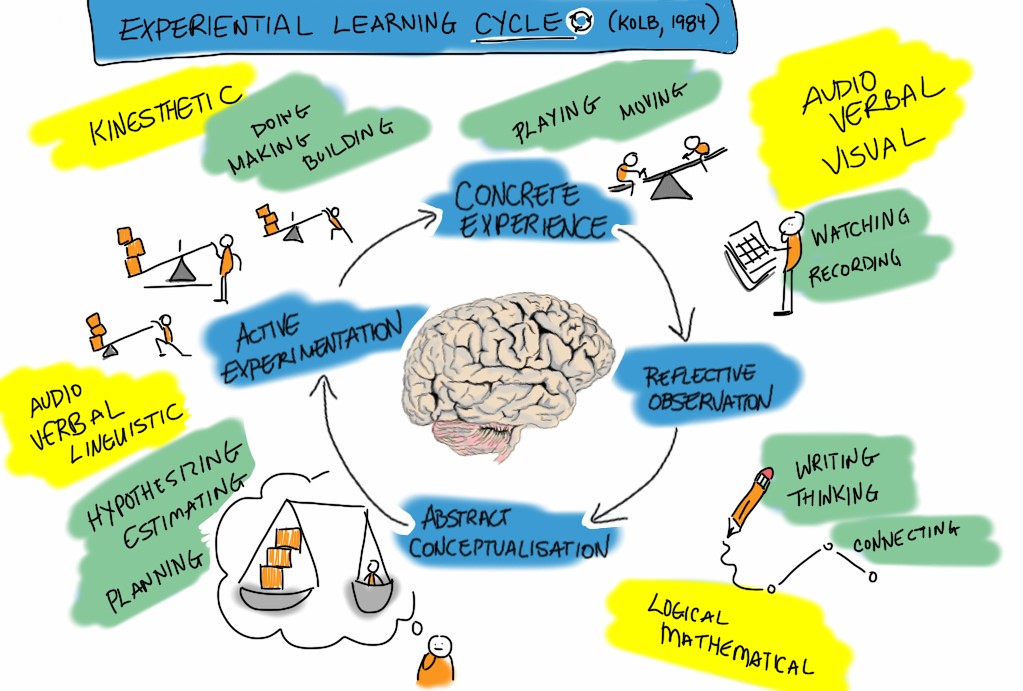45 Experiential Learning
Experiential Learning (EL) is a transformative educational approach that immerses students in hands-on activities and reflective practices, connecting theoretical knowledge to real-world application. Rooted in the philosophy of learning by doing and reflecting on that doing, EL empowers students to develop practical skills, critical thinking, and self-awareness, fostering both personal and professional growth.
Defining Experiential Learning
At its core, experiential learning involves an engaged learning process where students actively participate in experiences that challenge their understanding, encourage exploration, and require reflection. David Kolb’s (1984) experiential learning cycle provides a foundational framework, emphasizing the integration of:
- Knowledge: Concepts, facts, and theoretical insights.
- Activity: The application of this knowledge in real-world or simulated contexts.
- Reflection: A critical examination of the experience to synthesize new understanding.

Key elements of experiential learning include:
- Reflection, Critical Analysis, and Synthesis: Encouraging students to examine and evaluate their experiences deeply.
- Active Engagement: Offering opportunities to take initiative, make decisions, and be accountable for outcomes.
- Holistic Involvement: Intellectual, emotional, social, and physical engagement in the learning process.
- Real-World Relevance: Designing learning experiences that allow students to learn from natural consequences, mistakes, and successes.
Why Experiential Learning Matters
Experiential learning transforms passive learning into active engagement, equipping students with skills highly valued by employers and society. Benefits include:
- Deepened Understanding: Connecting classroom knowledge to real-world challenges enhances comprehension and retention.
- Skill Development: Strengthens critical thinking, collaboration, and adaptability.
- Civic and Cultural Engagement: Encourages students to contribute meaningfully to communities and navigate diverse cultural contexts.
- Professional Preparation: Builds resumes, develops career-specific competencies, and prepares students for lifelong learning.
The Boyer Commission (1998) and the National Association of Colleges and Employers (2016) highlight experiential learning as a cornerstone for producing adaptable, skilled graduates.
Types of Experiential Learning Activities
Experiential learning encompasses a wide variety of activities tailored to different disciplines and learning objectives.
Examples:
- Internships
Hands-on work experiences that bridge academic theory with professional practice. Students gain industry-specific insights under supervision. - Service Learning
Structured opportunities for students to address community needs while reflecting on their role as engaged citizens. - Field Work
Research or practice conducted in natural or community settings, common in disciplines like anthropology, sociology, and environmental science. - Student Teaching and Clinical Education
Supervised teaching or practical experience in health care, law, and other professional fields, combining skill-building with real-world application. - Practicums
Applied learning experiences that integrate theoretical coursework with supervised practice. - Undergraduate Research
Opportunities for students to collaborate on faculty-led research projects or conduct independent studies, often culminating in presentations or publications. - Community-Based Research
Partnerships between faculty, students, and community organizations to address local challenges through collaborative inquiry. - Study Abroad
Cultural immersion experiences that blend academic coursework with the challenges of navigating a new environment. - Creative and Entrepreneurial Projects
Capstone courses and entrepreneurial ventures where students develop innovative solutions for real-world clients or organizations. - Faculty-Led Field Trips
Short-term trips that allow students to explore academic concepts in context, from archaeological digs to ecosystem studies.
Key Principles for Facilitating Experiential Learning
Instructors play a critical role in designing and guiding effective experiential learning experiences. Consider the following principles:
- Design for Impact
Choose experiences that align with learning objectives and challenge students to engage with complex, real-world problems. - Support and Guide
Serve as a facilitator, providing resources, posing questions, and ensuring students’ physical and emotional safety. - Encourage Reflection
Integrate structured reflection opportunities before, during, and after experiences to help students connect theory with practice. - Foster Relationships
Build connections between learners, instructors, and the broader community to enhance the learning process. - Assess Outcomes
Use rubrics, reflective essays, presentations, and peer feedback to evaluate both process and product.
The Transformative Potential of Experiential Learning
Experiential learning transforms the campus—and the world beyond—into an interactive classroom where students gain deeper insights, cultivate professional skills, and contribute to their communities. As Kolb reminds us, experiential learning is not just about gaining knowledge but understanding how to learn, adapt, and thrive in a rapidly changing world. Whether through internships, research, or civic engagement, experiential learning fosters curiosity, innovation, and a commitment to lifelong growth.
Sources and Attribution
Primary Sources
This section is informed by and adapted from the following sources:
- Ithaca College, Center for Faculty Excellence. What is Experiential Learning?
- Available at: Ithaca College Website
- Bowie State University, Division of Academic Affairs. Experiential and Integrative Learning: About Experiential Learning and High-Impact Practices.
- Available at: Bowie State Website
- Boston University, Center for Teaching & Learning. Experiential Learning.
- Available at: BU CTL Website
Use of AI in Section Development
This section was developed using a combination of existing research, expert-informed insights, and AI-assisted drafting. ChatGPT (OpenAI) was used to:
- Synthesize key principles of experiential learning into a cohesive and accessible guide for educators.
- Clarify best practices for implementing hands-on, real-world learning opportunities that enhance student engagement and knowledge retention.
- Enhance readability and coherence, ensuring that experiential learning strategies are both research-based and practically applicable in various educational settings.
While AI-assisted drafting provided a structured foundation, all final content was reviewed, refined, and contextualized to ensure accuracy, pedagogical effectiveness, and alignment with cited sources. This section remains grounded in institutional best practices and respects Creative Commons licensing where applicable.
Media Attributions
- kolb learning cycle cc2
